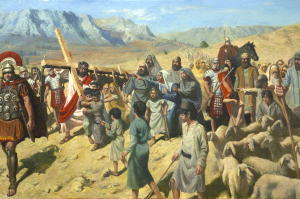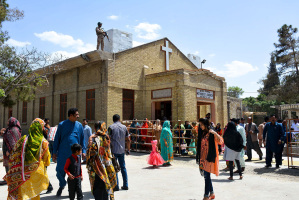Six Months Later
26/12
26/12 -- South Asians write the day before the month -- has been etched in their minds, much as 9/11 has lodged in the American consciousness. In an environment that throbs with thought and talk about God, much as America thinks and talks about cars and sex, souls quaked amid the bodies in the aftermath of the tsunami last December.
Six months later, with tens of thousands still listed as missing and thousands of bodies not yet identified because medical records were swept away, God-talk hasn’t died. Unlike America’s brief return to religious awareness, public prayers and church attendance after 9/11, South Asia will continue to pulsate with God-thought, despite 26/12.
Christians joined the rest of the world in rapid response, but some were criticized for mixing quake-aid with preaching. Yes, they were going to help but were they taking advantage of people in deep suffering in order to proselytize?
Now, Christians ought to admit deep regret over this gross error on the part of a well-meaning few. Their fault lies in strategy and timing, but not in terms of purpose and conviction. Why?
Followers of Christ will always be “going.” They heard that final word from their Master and have been going for 2,000 years to the hardest, remotest, neediest parts of the world. Christians already live in the thirteen countries affected by the earthquake and tsunami, with many of their own having died.
In those countries, Christian good works, if permitted, often preceded governmental and international initiatives. I personally know Christians, churches and organizations in America who rushed rescue and relief efforts, before any other aid arrived, all without seeking conversions of non-Christians.
Christians will always be “going” about doing good, as did their Leader. Followers of Jesus Christ should provide aid to any needy neighbor, irrespective of religious persuasion. Six months later, I know Christians, churches and organizations in the forefront of tsunami rehabilitation work, who do not proselytize, even as the world has moved on to other priorities.
What prompts immediate obedience and staying strength in the face of horrific human need?
It’s because when Christians go to help, they go in the name of Jesus. Again, I know local as well as foreign (Western and non-Western) Christians who gave liberally and went to villages doing good in the name of Jesus. That last phrase keeps Christians from becoming another non-governmental agency and provides the spirit for sacrificial and sustained service. Going in the name of Jesus also means that Christians not only expect and extend religious tolerance, they endeavor to love all people indiscriminately, regardless of culture, creed and caste.
Eventually, Christians cannot help but go with the name of Jesus to those affected by disaster. Those not personally affected by loss may find hope from the message of Jesus almost right away. But as life must return to a semblance of routine, Christians go with the name of Jesus to the suffering in order to present personal hope. They go because of inner conviction; they rejoice in potential social impact; but they speak personal hope to all. If earthly life is not all there is to human life; and if their Lord Jesus provides hope for this life, and in this life, for the next; and if disasters can strike anytime, anywhere -- people still run inland when beach water level rises by a few inches -- then Christians must go with the name of Jesus. Christians are not to confuse physical aid for spiritual aid, though spiritual aid helps physical existence. They will not make physical aid contingent on conversion, for true conversion does not arise from physical aid. Yet for Christians, it is their conviction that when Jesus, to paraphrase the bank slogan, becomes “the world’s local Savior,” he gives each individual hope in uncertainty, peace in turmoil and life in the middle of death.
Christians will keep going in the name of Jesus first, and with the name of Jesus later -- six months, six years or six decades after a disaster -- because they are personally compelled by a Jesus-like ministry that provides spiritual vitality and community resources to all people, over the long haul.
UNICEF now tells us that “the lack of rain in agricultural regions of Ethiopia could lead to the death of 300,000 children in the near future…that’s one tsunami.” Sorry, but I need to go.
______________________________________________________
Dr. Ramesh Richard serves as the leader of Ramesh Richard Evangelism and Church Health (RREACH), which has helped churches in India and Sri Lanka respond to the tsunami. He is also a professor of pastoral ministries, world missions and intercultural studies at Dallas Theological Seminary.




























